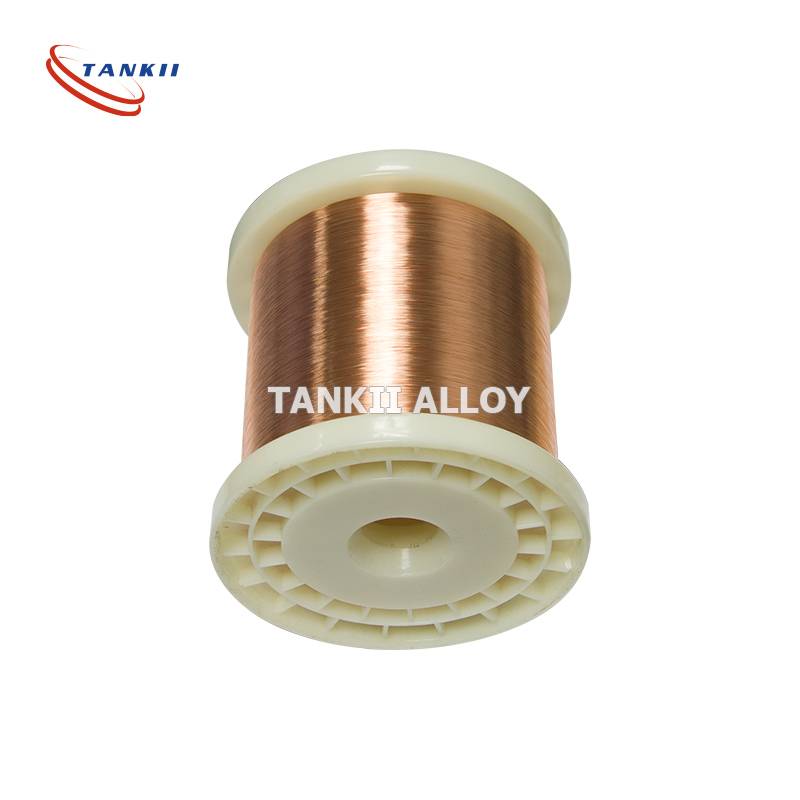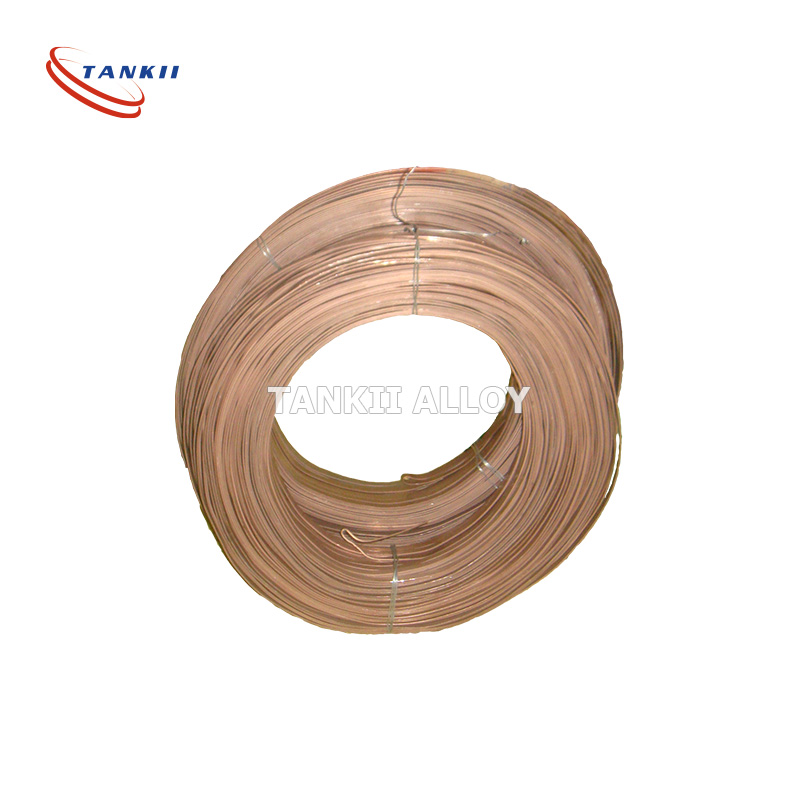6J12 Precision Resistance Alloy Tube Stable Resistivity Low Temp Coefficient
6J12 precision resistance alloy tube, a high-performance functional alloy product independently developed and manufactured by Tankii Alloy Material, is a typical manganese-copper (Mn-Cu) based precision resistance alloy tube. Crafted via advanced vacuum smelting, precision extrusion, and controlled atmosphere annealing processes, this tube maintains the core performance advantages of 6J12 alloy while featuring a hollow tubular structure. It integrates ultra-low temperature coefficient of resistance (TCR), stable high resistivity, and excellent mechanical strength –making it an ideal material for precision current shunts, high-stability sensor casings, and special resistance components in aerospace, metrology, and industrial control fields that require both resistance performance and structural lightweight.
- Alloy Grade: 6J12 (Chinese standard manganin precision resistance alloy grade; belongs to Mn-Cu-Ni series)
- International Equivalents: Similar to DIN 17471 CuMn12Ni2, ASTM B193 Manganin, UNS C75400 (for high-precision resistance scenarios)
- Form: Seamless tube (standard); welded tube (customizable for large-diameter specifications)
- Compliant Standards: Adheres to GB/T 1234-2019 (Chinese standard for resistance alloys), GB/T 8890-2015 (standards for seamless copper alloy tubes), and IEC 60404-8-2
- Manufacturer: Tankii Alloy Material, certified to ISO 9001 and RoHS, with specialized production lines for precision alloy tube extrusion and processing
6J12 alloy tube stands out for its unique combination of resistance performance and tubular structural advantages:
- Superior Resistance Stability (Core Advantage of 6J12): Temperature coefficient of resistance (TCR) as low as ±5 ppm/°C (-50℃ to 150℃), far lower than constantan alloy tubes (±20 ppm/°C) and copper alloy tubes (±4000 ppm/°C). Resistivity remains stable at 0.48±0.02 μΩ*m (20℃), with resistance drift <0.005% after 1000 hours of operation at 100℃–critical for precision current measurement and resistance control.
- Tubular Structure Advantage: Hollow structure achieves 30-50% weight reduction compared to solid 6J12 bars of the same outer diameter, meeting lightweight requirements for aerospace and automotive electronic components. Meanwhile, the inner cavity can be used for heat dissipation or as a channel for fluid medium, expanding application scenarios (e.g., integrated sensor tubes with both resistance sensing and fluid guiding functions).
- Excellent Mechanical & Processing Performance: Seamless extrusion process ensures uniform wall thickness and structural integrity–tensile strength reaches 450-500 MPa (annealed state) and elongation ≥25%, enabling bending, flaring, and threading without cracking. The smooth inner/outer surfaces (Ra ≤0.8μm) reduce fluid resistance and facilitate precise resistance value calibration.
- Strong Corrosion & Thermal Stability: Mn-Cu-Ni alloy composition forms a dense passive film, resisting atmospheric corrosion, freshwater, and mild chemical environments (pH 4-10). Passes 1000-hour ASTM B117 salt spray testing with negligible performance decay. Low thermoelectric potential (≤1μV/℃ vs. copper) ensures stable signal transmission in low-voltage circuits.
| Attribute | Value (Typical) |
|---|---|
| Chemical Composition (wt%) | Cu: 84.0-86.0%; Mn: 11.0-13.0%; Ni: 2.0-3.0%; Fe: ≤0.3%; Si: ≤0.1%; C: ≤0.05% |
| Outer Diameter Range | 2mm – 50mm (tolerance: ±0.05mm for ≤10mm; ±0.1mm for >10mm) |
| Wall Thickness Range | 0.2mm – 5mm (tolerance: ±0.02mm for ≤1mm; ±0.05mm for >1mm) |
| Length | 500mm – 6000mm (cut-to-length available: ≥100mm) |
| Resistivity (20℃) | 0.48±0.02 μΩ*m |
| Temperature Coefficient of Resistance (TCR) | ±5 ppm/°C (-50℃ to 150℃) |
| Thermoelectric Potential (vs Cu) | ≤1 μV/℃ (0℃ to 100℃) |
| Operating Temperature Range | -50℃ to 120℃ (continuous); Short-term: up to 150℃ (≤1 hour) |
| Tensile Strength | Soft (annealed): 450-500 MPa; Half-hard: 550-600 MPa; Hard: 650-700 MPa |
| Elongation (25℃) | Soft: ≥25%; Half-hard: 15-20%; Hard: ≤10% |
| Hardness (HV) | Soft: 130-150; Half-hard: 180-200; Hard: 230-250 |
| Surface Roughness (Ra) | Inner/Outer: ≤0.8μm (polished finish optional: ≤0.2μm) |
| Item | Specification |
|---|---|
| Tube Type | Seamless tube (standard); welded tube (custom for outer diameter >50mm) |
| Surface Finish | Bright annealed (oxide-free, oil-free); optional polished finish for high-precision applications |
| Roundness | ≤0.05mm (for outer diameter ≤10mm); ≤0.1mm (for outer diameter >10mm) |
| Straightness | ≤1mm/m |
| Machinability | Compatible with CNC turning, milling, threading, and flaring; no burrs after processing |
| Weldability | Suitable for TIG welding and spot welding–welded joints have resistance variation ≤0.1% |
| Packaging | Vacuum-sealed in anti-oxidation aluminum foil bags with desiccants; wooden crates or steel frames for long-length tubes to prevent deformation |
| Customization | Non-standard outer diameter/wall thickness; special temper adjustment; inner cavity polishing; anti-tarnish passivation treatment |
>
- Precision Current Shunts: Tubular current shunts for high-voltage power meters and EV battery management systems (BMS)–hollow structure facilitates heat dissipation, ensuring stable resistance under high-current conditions.
- Special Sensor Casings: Integrated sensor tubes for pressure/temperature composite sensors–6J12′s resistance stability enables accurate signal conversion, while the inner cavity accommodates sensing elements.
- Aerospace Components: Lightweight resistance tubes for aircraft avionics and satellite communication equipment–weight reduction meets aerospace payload requirements without compromising performance.
- Industrial Control Valves: Resistance-adjustable control valves for fluid systems–6J12′s resistance performance enables precise flow control, and the tubular structure serves as a fluid channel.
- Metrology Equipment: Standard resistance tubes for laboratory calibration instruments–ultra-low TCR ensures long-term calibration accuracy (error ≤0.01%).
Tankii Alloy Material implements strict quality control for 6J12 alloy tubes: each batch undergoes XRF chemical composition analysis, high-precision TCR testing (temperature-controlled resistance tester with accuracy ±0.1 ppm/°C), wall thickness uniformity inspection (ultrasonic thickness gauge), and pressure resistance testing (for fluid-carrying applications). Free samples (100mm length) and detailed material test reports (MTR) are available upon request. Our technical team provides tailored support–including tube size optimization, processing technology guidance, and resistance performance matching–to help customers maximize the application value of 6J12 alloy tubes.
Products categories
-

Phone
-

E-mail
-

Whatsapp
-

WeChat
Judy
150 0000 2421
-

Top









